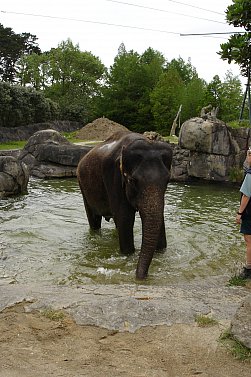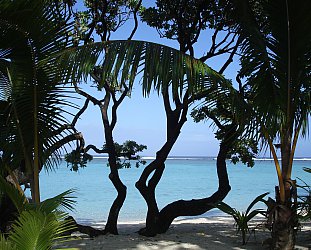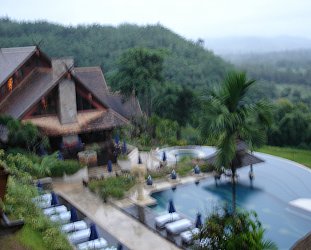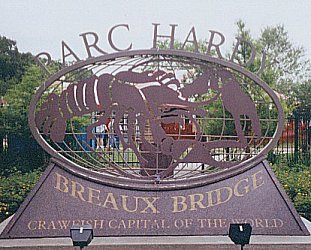Graham Reid | | 5 min read

"The English invent the most stupid of sports," says John. He should know, he's English and we've been talking about cricket.
We're sitting at the poolside bar in the sumptuous Anantara Resort and Spa near the coastal town of Hua Hin, three hours south of Bangkok. The reason for his outburst is the game we have spent this September day watching: elephant polo.
At the Somdej Phra Suriyothai military camp half an hour down the road heavily sponsored teams have battled it out in scorching heat before a tiny audience of corporate guests, a contingent of international media which almost outnumbers the participants, and a few bemused locals and soldiers.
The whole thing has been utterly absurd, but ponderous pachyderms suddenly become as agile as ponies under the guidance of the local mahouts and the players, who carry three metre long sticks and aim for a ball which can often be trampled into the dirt under very large feet.
Yet there is also something oddly enjoyable in this sport where its participants spend as much time being photographed before and after a game as they do banging the ball around.
It all feels very quaint and British Raj -- and indeed one of the older hands is the handsome Colonel Raj Kalaan from India, known to all as the Silver Fox for his thick white hair.
During the sweaty tournament in tropical heat plenty of water is drunk, but so are gallons of Chivas Regal thanks to one of the sponsors. And by night these people who play hard -- 14 teams including one of former-All Blacks Stu Wilson, Bernie Fraser and Steve McDowell -- party even harder.
Elephant polo is not the sport of the common man: teams at last year's event were sponsored by heavyweights such as Mercedes Benz, American Express, British Airways and, in the case of the former All Blacks (who embarrassingly almost lost to a team of Bangkok transvestites, the hilariously named Screwless Tuskers), by PricewaterhouseCooper. It also isn't for the faint-hearted.
The elephants can get up a fair bit of pace and if you've ever been atop one you know it can be a bumpy ride even when they dawdle. Add to that swinging a long stick at a tiny ball, the searing sun, and chukkas (halves) which last well over the allocated seven minutes because of stoppages and you have a game which is . . . well, as John said, pretty damn stupid.
But also a lot of fun.
The supporters in the tents -- one of which serves a never-ending and ever-changing menu of Chivas cocktails -- bay with delight as the massive animals gallop around the park followed by a small army of cleaners who collect the small mountains of dung an elephant leaves when in a state of high excitement.
With a cocktail in hand, the Germans sounding like hooray-Henrys, and Torquhil Ian Campbell, the 13th Duke of Argyll in attendance as a player in the Chivas Regal team, this is a lovely day out in the old colonial manner.
The World Elephant Polo Association which organises this annual event has a long and illustrious history dating back to the days of the British Raj in India. Or so you might expect.
In fact the organisation established the rules in 1982 and has its headquarters at the Tiger Tops Jungle Lodge in the Royal Chitwan Park in Nepal. It is a registered Olympic sport with the Nepal Olympic Committee. It is in Nepal the major tournament is played (on an airfield), but in 2001 two new competitions were launched: this King's Cup tournament in Hua Hin, and another in Galle, Sri Lanka in February which was cancelled this year after the tsunami ravaged the area.
The rules are similar to horse polo but the field is about a third the size, each team has three elephants, no more than two may be in the D (the area demarked by that pitch marking in front of the goal), and elephants may neither pick up a ball nor lie down in the goalmouth.
And, "sugar cane or rice balls packed with vitamins (molasses and rock salt) shall be given to the elephants at the end of each match and a cold beer or soft drink to the elephant drivers -- and not vice versa."
Over the week it can be hilariously engaging -- I never thought I'd be shouting "elephant in the D" with such fervour, let alone know what it meant.
But better is the fact that this curious sport is peopled by larger-than-life characters. Margie McDougal from Nepal is a fierce and longtime competitor in the Bangkok Bank Ladies team. She haughtily delivered this accidentally ambiguous innuendo to the ladyboys in the Screwless Tuskers after some on-field shenanigans: "If you want to be ladies, play like ladies. No hooking."
The name "Oliver Winter" is heard everywhere as this exceptionally skilful player -- who imports polo ponies from Germany, Argentina and Brunei -- tried to drive his Mercedez Benz team to victory for the third time.
After a week of heats by day and parties by night at the Anantara Resort, another high-end sponsor, the Sunday afternoon final was between Australia and Winter's Mercedez Benz Thailand before a huge crowd of tourists and numerous locals who had heard the hometeam were contenders. And -- in front of a representative of the King who arrived in limo with an entourage -- they got the perfect result, the first Thai victory ever.
The English finished well down the rankings, above the All Blacks.
The King's Cup Elephant Polo Tournament is almost incidentally about elephant polo. It is about having a very good time. Peter Prentice of the Chivas team -- now into his 18th year playing -- is a man for whom life is a party. His occasional commentary on the games was punctuated with shameless plugs for the sponsors (and the new pair of Timberlands shoes he bought and was clearly comfortable in), and as the day progresses his hyperbole inflates accordingly.
During the final game he describes the players as "the ultimate athletes" to loud guffaws and applause. "It's not pretty, but it is elephant polo," he shouts and, when the young Australian team take to the field -- after the numerous pre-match photographs which seem obligatory -- he bellows, "The whole of Perth, actually the whole of Australia is watching these wonderful young men today."
It adds a farcical and self-deprecating touch to what is otherwise taken very seriously, and is collecting money for a serious cause.
The event raises funds for the Thailand Elephant Conservation Centre in Lampang, northern Thailand which provides welfare, sustenance, medical care and employment for the Kingdom's 1500 wild and 2500 domesticated elephants. To date the event has raised around US$65,000 and people are prepared to dig deep, especially at the Saturday night auction which comes after another long dinner for a couple of hundred outdoors at the Anantara and plenty of drinks.
Up for auction are return flights to the UK on British Airways (another sponsor), mobile phones (from another, Mobile Easy Thailand) and paintings by elephants. All of them realise bids beyond their market value -- although it is admittedly hard to asses the value of a painting by an elephant. Over $US200 as it turns out.
When the first elephant polo tournament was launched in Thailand there were only six teams participating. Last year there 14 plus a waiting list.
Now it is the sixth largest event on the Thai tourism calendar and gets international coverage, largely because so many media are flown in to be entertained, wined and dined.
On the final night John and I are, inevitably, back in the cool poolside bar in the Anantara. We are laughing about the absurdity of this game which has obviously been invented by rich people with too much time on their hands. But also agreeing just how enjoyable these few days have been.
"You were right the other night," I say. "It's a bloody stupid sport, but a lot of fun. Especially the post-match parties."
"Yes, we invent stupid sports," he says turning glum. "Then everyone beats us at them."
For other travel stories by Graham Reid, see here for his two award-winning travel books.







post a comment